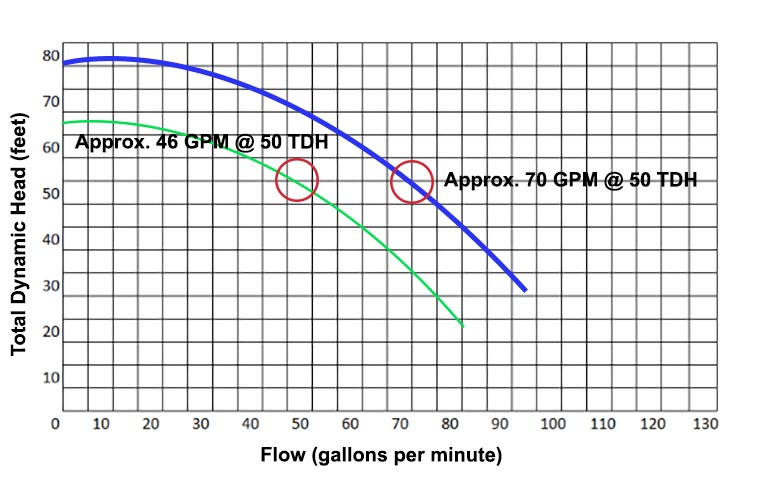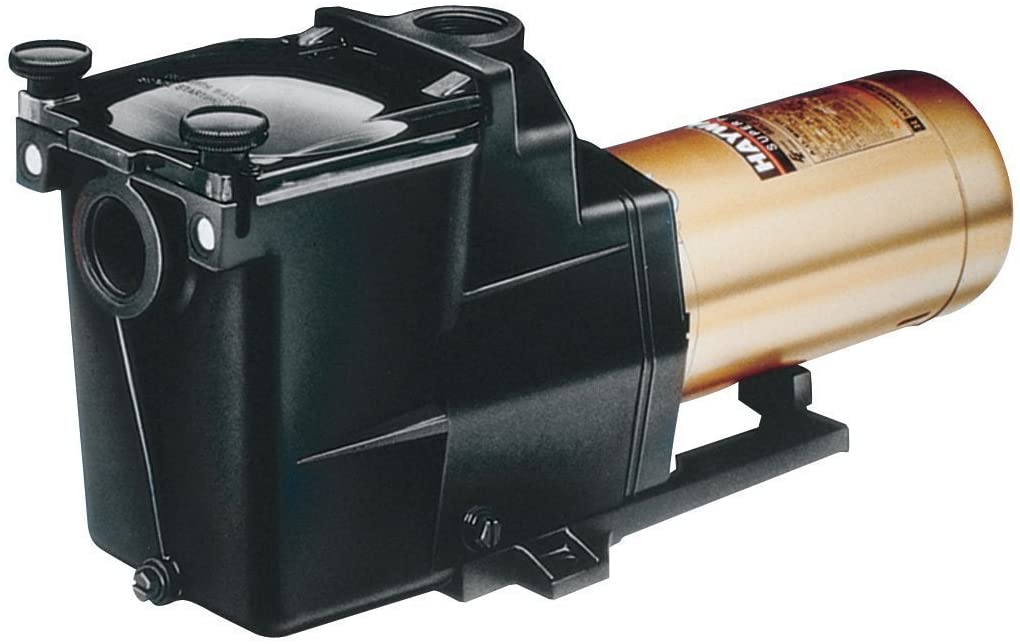So your pool pump is damaged or isn’t working as well as it should and you’re thinking of getting a bigger replacement.
But can you use a bigger pool pump?
Let’s find out.
It isn’t recommended that you use a bigger pool pump unless the pool already has an undersized pump installed, as the filter will not operate properly. Most residential pools will require a 1/2 to 1 horsepower pump. Though, the pool pump size must match the pool’s plumbing size and the pool filter’s flow rate.
Article Contents
What Happens If a Pool Pump is Too Big
Usually, the mindset of pool owners is that a bigger pump is better. A bigger pump is not better. A pool pump can actually be too big for a pool.
Using a bigger pool pump in your pool comes with the following problems:
- Higher running cost due to a higher energy demand
- Poor water filtering due to a faster flow rate for the pool filters
- Higher risk of leaks in the pool plumbing due to a higher flow rate.
So what is the correct size pump for your pool? When is it OK to use a larger pump? We’ll discuss more on this as we go deeper into the topic.
Larger Pumps Have Higher Running Costs
The main negative of using a bigger pool pump for your swimming pool is an increased overall cost. A bigger pool pump will cost more to buy and will use up to 4 the electricity of a smaller pump.
How much more will it cost? You can use this pump running cost calculator on our website to find out exactly.
You can also get an estimate using this table below:
| Pool Pump Size (in hp) | Expected Cost Per Hour | Expected Cost Per Day (The pump runs 8 hours p/day) | Expected Cost Per Week |
| 0.5 | 0.03 | $0.24 | $1.68 |
| 1 | 0.06 | $0.48 | $3.36 |
| 1.5 | 0.09 | $0.72 | $5.04 |
| 2 | 0.12 | $0.96 | $6.72 |
| 2.5 | 0.15 | $1.20 | $8.40 |
| 3 | 0.18 | $1.44 | $10.08 |
From the table above, you can see that a pool pump size upgrade will cost you more to run. The above numbers are however mere estimates. The cost of running your pool pump will depend on the cost of electricity where you live and the water capacity of the pool.
That said, it’s ideal to select the smallest pool pump that will get the job done.
The average-sized swimming pool will be circulated properly with a 0.5-1hp (horsepower) pool pump.
Related Reading: What Gauge or Thickness Wire Does a Pool Pump Need?
Pipe Size Limits Flow
The size of the pool’s pipes impacts the amount of water your pump can move. Just because you have a bigger pump doesn’t mean it can move all of that water. If the pump’s flow rate is rated higher than the pipes’ capacity, then the water flow will be restricted.
For example, if you paired a pump that could move 120 gallons per minute (GPM) and your pool only had 2″ PVC pipes, you would be limited to the pipe’s maximum flow rate which in the case of 2″ pipes, it’s about 75 GPM.
A bigger pump combined with underrated pipes will strain the pool plumbing due to increased water pressure. Eventually, the pool pipes can expand and develop leaks.
Sure, often bigger is better but with pool pumps, it’s not true.
Filter Flow Rate Limits
People often mistakenly think that with a larger pool pump with a higher flow rate, they can filter their water faster. Whilst to some degree this is true, a higher flow rate can actually result in a reduction in filtering efficiency and performance.
How can that be?
Pool filters, whether they are sand filers, DE Filters or cartridge filters have a minimum and maximum flow rate. If your pump is too large and the water flow to the filter is above the filter’s rated flow rate, the filter will not filter properly. In sand filters it can cause channel and in cartridge filters, it can deeply embed debris in the filter medium blocking it up.
This is another reason why you should not use a pump that is larger.
Bigger Pump = More Flow Rate. Right?
If you use a 2hp pool pump for your pool, providing your pipe size can handle it, you will indeed move more water than a smaller 1hp pump. However, the percentage increase in water circulation is not proportional to the additional running costs.
In other words, a pump with double the horsepower will not move double the amount of water. But the electricity costs/use will be double.
For example, with a pool pump upgrade from 1hp to 2hp, you’ll only get about 50% more water flowing, but your electricity bill will be double.
Check out the example in the table below. The table shows a typical performance curve for two pumps. The purple line shows a 2hp pump and the green line shows a 1hp pump. If we look at the flow rate where the total dynamic head (THD) is 50, the 1hp pump moves approx. 46 GPM and the 2hp pump moves approx. 70 GPM.
Although the 2hp pump is double that of a 1hp pump and uses twice the power, only 50% more flow is achieved.

In clearer terms, you’ll be spending a lot more and getting diminishing returns with a more powerful pool pump.
Side Note: Total dynamic head refers to the resistance of the water working against the pump.
What’s the Ideal Size Pump?
The ideal pump will filter all the pool’s water (called turnover) in about 8 hours. It’s ideal to turn over all the pool’s water 1-2 times per day. Usually, a 0.5 to 1 horsepower pump is suitable for residential inground and above-ground pools.
There is a way to calculate this further. What follows is an overview of how to do this. For full details, we have a full guide on choosing a pool pump here:
How to choose a pool pump
Here’s the steps to take:
1. Calculate the pool’s volume of water
2. Calculate the required flow to turnover the water in 8 hrs
3. Consider the minimum and maximum flow rate of the filter
4. Adjust the calculation for pipe size and total dynamic head
5. Select a pump to satisfy these criteria
Most residential pools (inground and above-ground) will require a pool pump size of 0.5 to 1 horsepower (hp).
In our full guide on choosing a pool pump, I step you through all of these calculations.
When is a Bigger Pool Pump OK?
In some situations, it’s OK to upgrade your pump and go for a larger one. For example, you may have added additional equipment, like a pool heater, to your pool since it was designed. This may mean a larger pump will be beneficial.
And to those of you that own Intex, Summer Waves and Bestway pools, some of these pools come supplied with a pump and filter, but it is sometimes a little small to clean the water well.
You can check if it’s too small by looking up the model and flow rate of the pump, then comparing this with your pool’s capacity.
You’ll now need to do a little math. The pump should have the ability to pump all the pool’s water through it in 6-8 hours. Take the pool’s capacity, divide it by by the pump’s flow (GPM). This will give you how long, in minutes, it takes to pump the water through once. Divide this by 60 to get hours. Your number should not be greater than 8. Ideally 6 or less.
Related Reading: Pool Pump Current (Amps) – 0.5 to 2.5 HP Motors
Final Thoughts
Overall, a bigger pool pump is definitely not better. It will cost a lot more to run and not give you any extra benefits, unless, of course, your pump is undersized to start with.
Choose the smallest pump you can that will still complete 1-2 water turnovers in around 8 hours. This will be the most efficient, give you better filtering and cost far less to run.


